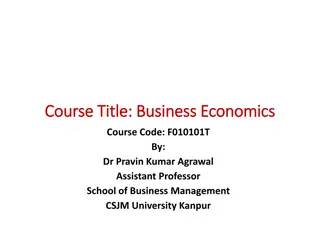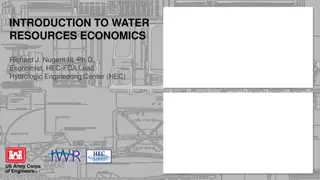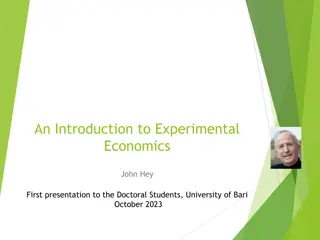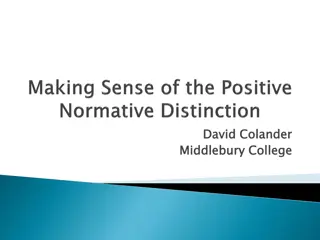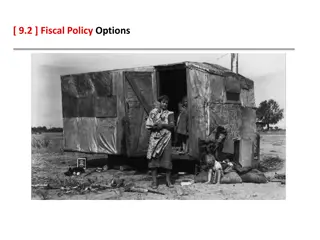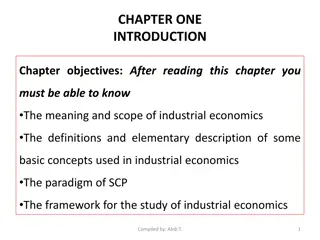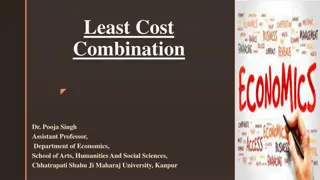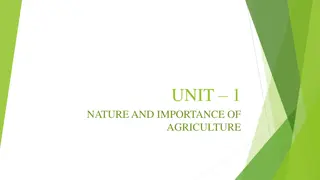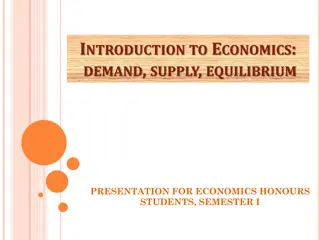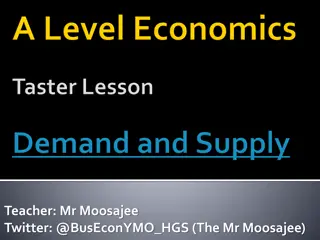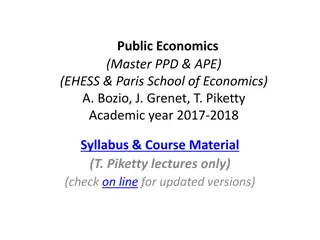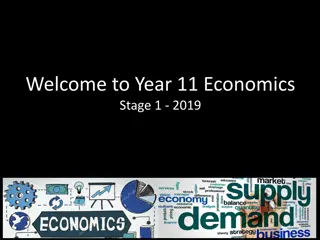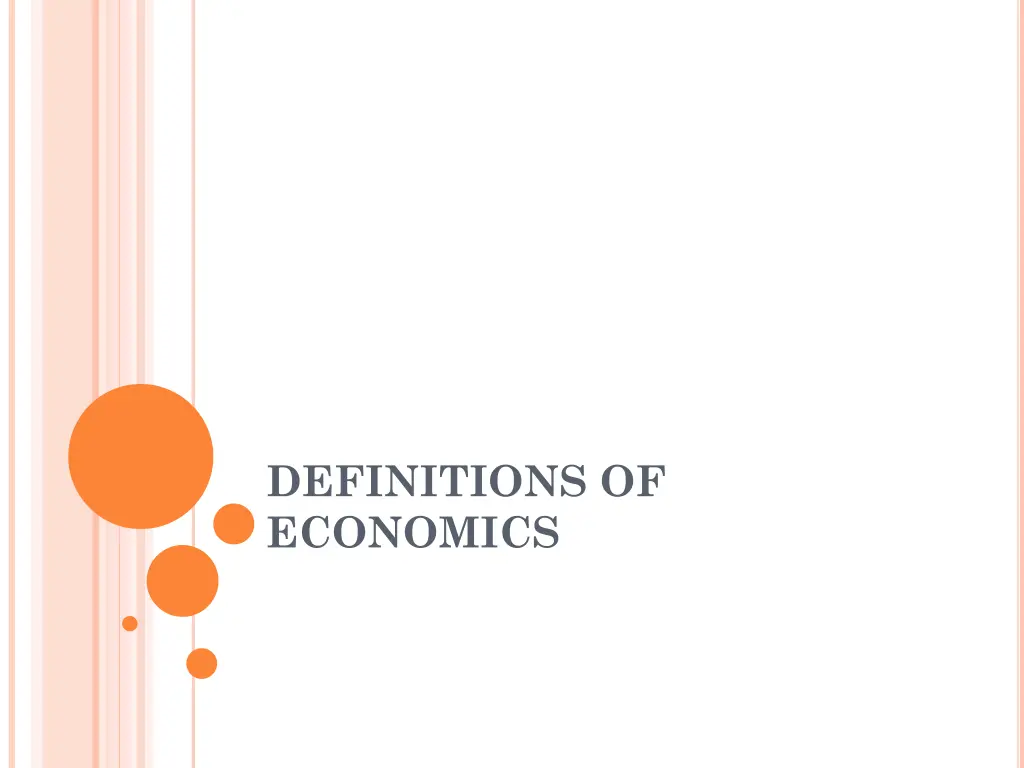
Evolution of Economics Definitions
Explore the evolution of economics definitions from wealth-centric approaches by Adam Smith to modern perspectives emphasizing choice-making and resource scarcity. Dive into the origins and criticisms of economic theories over time.
Download Presentation

Please find below an Image/Link to download the presentation.
The content on the website is provided AS IS for your information and personal use only. It may not be sold, licensed, or shared on other websites without obtaining consent from the author. If you encounter any issues during the download, it is possible that the publisher has removed the file from their server.
You are allowed to download the files provided on this website for personal or commercial use, subject to the condition that they are used lawfully. All files are the property of their respective owners.
The content on the website is provided AS IS for your information and personal use only. It may not be sold, licensed, or shared on other websites without obtaining consent from the author.
E N D
Presentation Transcript
DEFINITIONS OF ECONOMICS
INTRODUCTION Economics is a study of Choices or Choice making . Choice-making is relevant for every individuals, families, societies, institutions, areas, stats and nations and for the whole world. Hence, Economics has wide applications and relevance to all individuals and institutions.
MEANING OF THE WORD ECONOMICS The word Economics originates from a Greek word Oikonomikos . This Greek word has two parts: - Oikos meaning Home . - Nomos meaning Management . Hence, Economics means Home Management . In other words, Economics comes from the ancient Greek word oikonomikos or oikonomia. Oikonomikos literally translates to the task of managing a household. Economics emerged as a subject with high level of applications in all other disciplines due to its basic principle of Choice making for optimization with the given resources of scarcity and surplus .
EVOLUTION IN THE DEFINITIONS OF ECONOMICS Wealth Definition (1776) Adam Smith Welfare Definition (1890) Alfred Marshall Scarcity Definition (1932) Lionel Robbins Growth Definition (1948) P.A. Samuelson Modern Definition (2011) A.C. Dhas
WEALTH DEFINITION (1776) Adam Smith, who is regarded as Father of Economics, published a book An inquiry into the Nature and Causes of the Wealth of Nations in 1776. Adam Smith was a Scottish philosopher, widely considered as the first modern economist. Smith defined Economics as a science which inquires into the nature and cause of wealth of nations. He emphasized the production and growth of wealth as the subject matter of Economics.
FEATURES OF WEALTH DEFINITION CHARACTERSTICS : A. It takes into account only material goods. B. Exaggerated the emphasis on wealth. C. It inquires the caused behind creation of wealth.
CRITICISM OF SMITHS DEFINITION The wealth-centric definition of economics limited its scope as a subject and was seen as narrow and inaccurate. Smith s definition forced the subject to ignore all non- wealth aspects of human existence. The Smithian definition over-emphasized the material aspects of well-being and ignored the non-material aspects. It was assumed that human beings acted as rational economic agents who mindlessly strived to maximize their own well-being. The Smithian definition prevents the subject from exploring the concept of resource scarcity. The allocation and use of scarce resources are seen as a central topic of analysis in modern economics.
WELFARE DEFINITION (1890) British economist Alfred Marshall defined economics as the study of man in the ordinary business of life. Marshall argued that the subject was both the study of wealth and the study of mankind. He believed it was not a natural science such as physics or chemistry, but rather a social science.
FEATURES OF WELFARE DEFINITION CHARACTERSTICS: A. It is primarily the study of mankind. B. It is on one side a study of wealth and on other side the study of man. C. It takes into account ordinary business of life. It is not concerned with social, religious and political aspects of man s life. D. It emphasizes on material welfare i.e., human welfare which is related to wealth. E. It limits the scope to activities amenable to measurement in terms of money.
CRITICISM OF MARSHALLS DEFINITION The Marshallian definition, like the Smithian definition, ignored the problem of scarce resources, which possess unlimited potential uses. Marshall s definition restricted economics as a subject to only analyze the material aspects of human welfare. Non-material aspects of welfare were ignored. Critics of the Marshallian definition asserted that it was difficult to separate material and non- material aspects of welfare. The Marshallian definition does not provide a clear link between the acquisition of wealth and welfare. Marshall s critics claimed that it left the subject in a state of perpetual confusion. For instance, there are plenty of activities that might generate wealth but that can reduce human welfare.
SCARCITY DEFINITION Lionel Robbin, another British economist, defined economics as the subject that studies the allocation of scarce resources with countless possible uses. In his 1932 text, An Essay on the Nature and Significance of Economic Science, Robbins said the following about the subject: Economics is the science which studies human behavior as a relationship between ends and scarce means which have alternative uses.
FEATURES OF SCARCITY DEFINITION CHARACTERSTICS : A. Economics is a positive Science. B. New concepts : Unlimited ends, Scarce means and alternate uses of means. C. It emphases on Choice - A study of human behavior
CRITICISM OF ROBBINS DEFINITION A. Robbin s definition of economics transformed the subject from a normative social science into a positive science with an undue emphasis on individual choice. His definition prevented the subject from analyzing topics such as social choice and social interaction theory, which are important topics within modern microeconomic theory. B. Robbin s definition prevented it from analyzing macroeconomic concepts such as national income and aggregate supply and demand. Instead, economics was merely used to analyze the action of individuals, using stylized mathematical models.
DEVELOPMENT RELATED DEFINITION OF ECONOMICS
DEVELOPMENT RELATED DEFINITION OF ECONOMICS The modern definition, attributed to the 20th-century economist, Paul Samuelson, builds upon the definitions of the past and defines the subject as a social science. According to Samuelson, Economics is the study of how people and society choose, with or without the use of money, to employ scarce productive resources which could have alternative uses, to produce various commodities over time and distribute them for consumption now and in the future among various persons and groups of society. The definition introduced the dimension of growth under scarce situation.
FEATURES OF DEVELOPMENT RELATED DEFINITION CHARACTERSTICS : It is not merely concerned with the allocation of resources but also with the expansion of resources It analyzed how the expansion and growth of resources to be used to cope with increasing human wants. It is a more dynamic approach. D. It considers the problem of resource allocation as a universal problem. E. It focused on both production and consumption activities. F. It is comprehensive in nature as it is both growth- oriented as well as future-oriented. G. It incorporated the features of all the earlier definitions. A. B. C.


